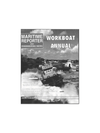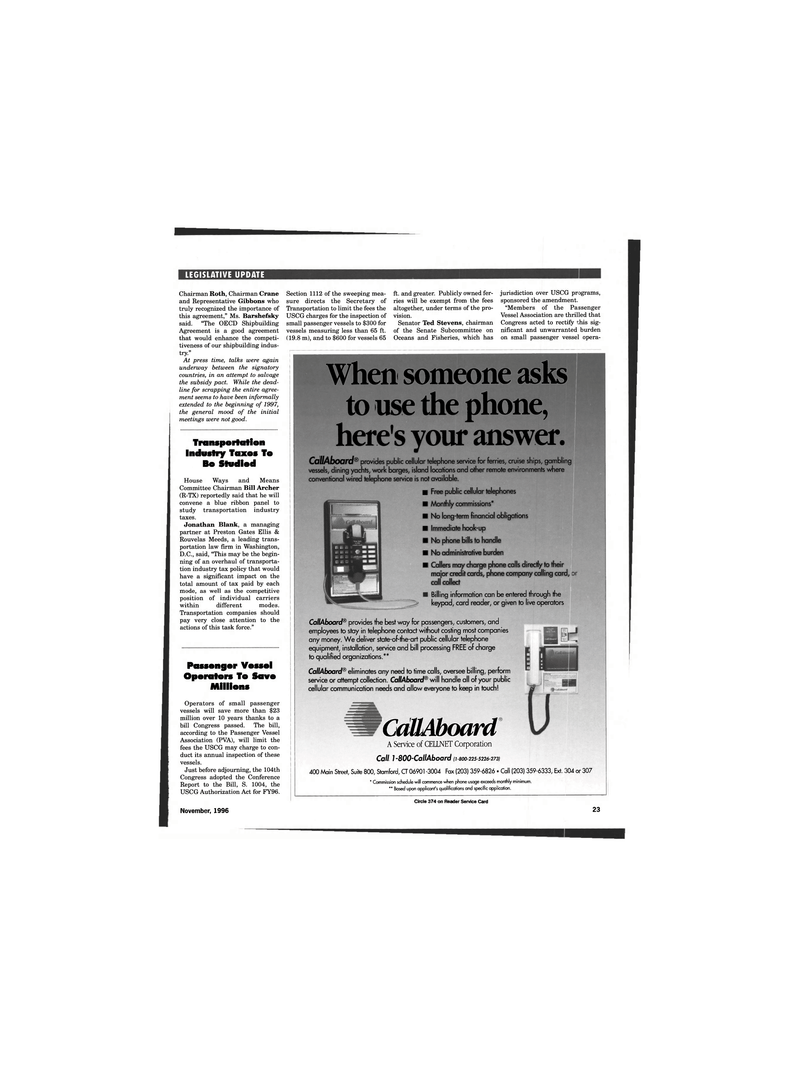
Page 21: of Maritime Reporter Magazine (November 1996)
Read this page in Pdf, Flash or Html5 edition of November 1996 Maritime Reporter Magazine
LEGISLATIVE UPDATE
Chairman Roth, Chairman Crane and Representative Gibbons who truly recognized the importance of this agreement," Ms. Barshefsky said. "The OECD Shipbuilding
Agreement is a good agreement that would enhance the competi- tiveness of our shipbuilding indus- try."
At press time, talks were again underway between the signatory countries, in an attempt to salvage the subsidy pact. While the dead- line for scrapping the entire agree- ment seems to have been informally extended to the beginning of 1997, the general mood of the initial meetings were not good.
Transportation
Industry Twos To
Bo Studied
House Ways and Means
Committee Chairman Bill Archer (R-TX) reportedly said that he will convene a blue ribbon panel to study transportation industry taxes.
Jonathan Blank, a managing partner at Preston Gates Ellis &
Rouvelas Meeds, a leading trans- portation law firm in Washington,
D.C., said, "This may be the begin- ning of an overhaul of transporta- tion industry tax policy that would have a significant impact on the total amount of tax paid by each mode, as well as the competitive position of individual carriers within different modes.
Transportation companies should pay very close attention to the actions of this task force."
Passenger Vessel
Operators To Save
Millions
Operators of small passenger vessels will save more than $23 million over 10 years thanks to a bill Congress passed. The bill, according to the Passenger Vessel
Association (PVA), will limit the fees the USCG may charge to con- duct its annual inspection of these vessels.
Just before adjourning, the 104th
Congress adopted the Conference
Report to the Bill, S. 1004, the
USCG Authorization Act for FY96.
November, 1996
Section 1112 of the sweeping mea- sure directs the Secretary of
Transportation to limit the fees the
USCG charges for the inspection of small passenger vessels to $300 for vessels measuring less than 65 ft. (19.8 m), and to $600 for vessels 65 ft. and greater. Publicly owned fer- ries will be exempt from the fees altogether, under terms of the pro- vision.
Senator Ted Stevens, chairman of the Senate Subcommittee on
Oceans and Fisheries, which has jurisdiction over USCG programs, sponsored the amendment. "Members of the Passenger
Vessel Association are thrilled that
Congress acted to rectify this sig- nificant and unwarranted burden on small passenger vessel opera-
When someone asks to use the phone, here's your answer.
CallAboard® provides public cellular telephone service for ferries, cruise ships, gambling vessels, dining yachts, work barges, island locations and other remote environments where conventional wired telephone service is not available. • Free public cellular telephones • Monthly commissions* • No long-term financial obligations • Immediate hook-up • No phone bills to handle • No administrative burden • Callers may charge phone calls directly to their major credit cards, phone company calling card, call collect
Billing information can be entered through the keypad, card reader, or given to live operators
CallAboard® provides the best way for passengers, customers, and employees to stay in telephone contact without costing most companies any money. We deliver state-of-the-art public cellular telephone equipment, installation, service and bill processing FREE of charge to qualified organizations.**
CallAboard® eliminates any need to time calls, oversee billing, perform service or attempt collection. CallAboard® will handle all of your public cellular communication needs and allow everyone to keep in touch!
CallAboard
A Service of CELLNET Corporation
Call 1-800-CallAboard (1-800-225-5226-273) 400 Main Street, Suite 800, Stamford, CT 06901 -3004 Fax (203) 359-6826 • Call (203) 359-6333, Ext. 304 or 307 * Commission schedule will commence when phone usage exceeds monthly minimum. ** Based upon applicant's qualifications and specific application.
Circle 374 on Reader Service Card 23

 20
20

 22
22
